
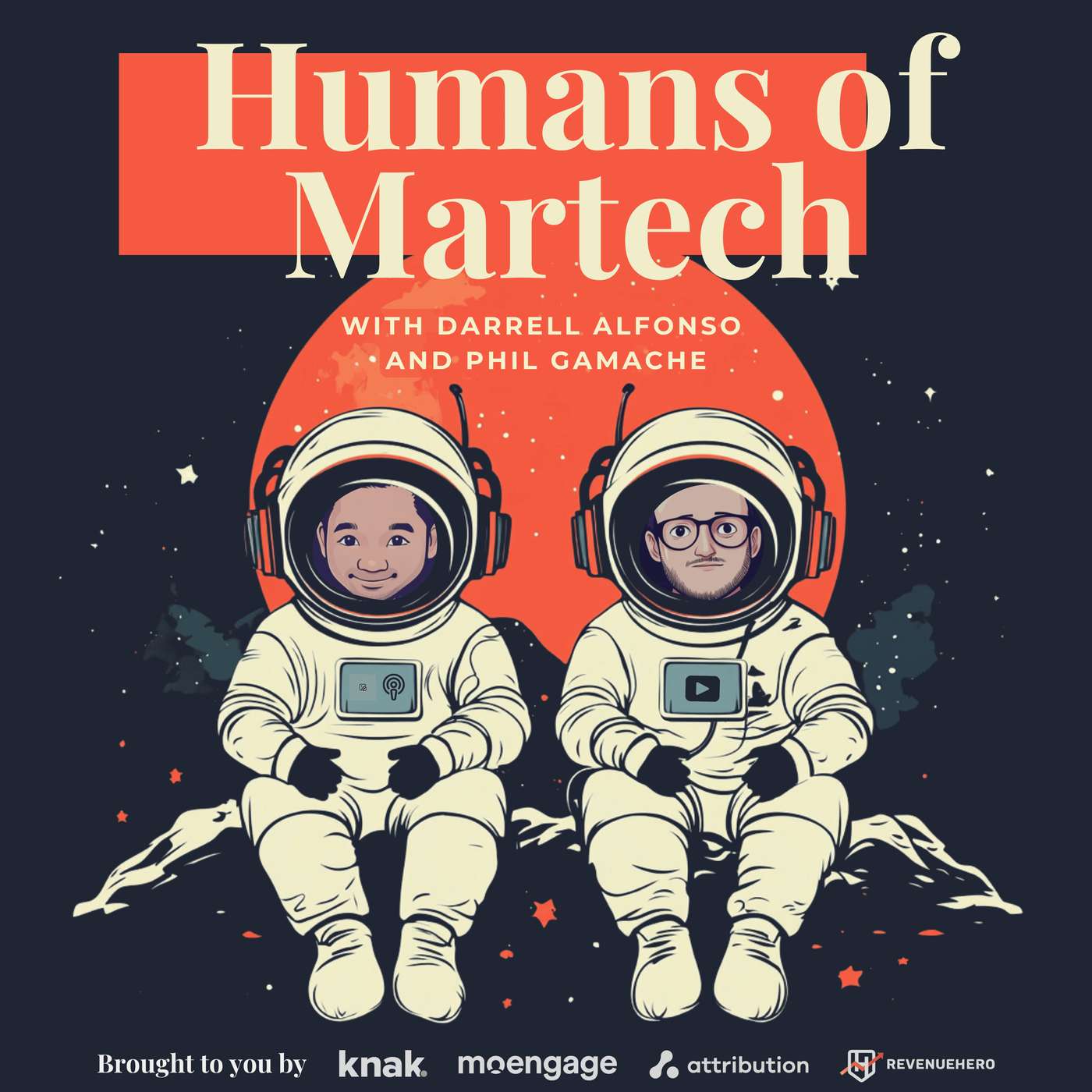
Humans of Martech
Phil Gamache
Future-proofing the humans behind the tech. Follow Phil Gamache and Darrell Alfonso on their mission to help future-proof the humans behind the tech and have successful careers in the constantly expanding universe of martech.
Episodes
Mentioned books
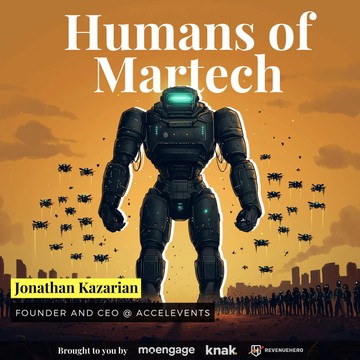
Sep 2, 2025 • 58min
185: Jonathan Kazarian: Platforms vs point solutions and the marketing operator’s dilemma
Join Jonathan Kazarian, Founder & CEO of Accelevents, as he tackles the marketing operator's dilemma of platforms versus point solutions. He likens point solutions to tempting distractions that can weigh teams down, while highlighting their ability to meet specific needs faster. The discussion dives into the significance of data models and integration depth, revealing how support responsiveness differs between smaller teams and larger platforms. Kazarian's insights on managing shiny object syndrome and the relentless pursuit of growth shed light on the evolving marketing landscape.
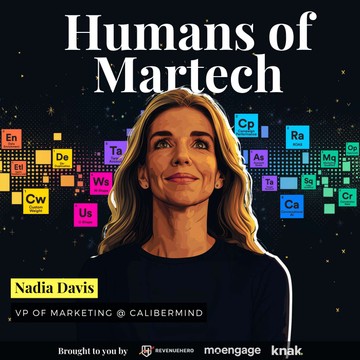
Aug 26, 2025 • 1h 9min
184: Nadia Davis: How to decide if attribution data is good enough to guide strategy
Nadia Davis, VP of Marketing at CaliberMind, boasts over 15 years in B2B marketing. She introduces her Attribution Periodic Table, highlighting its role in bridging data to revenue while addressing why marketing has a higher ROI pressure. Nadia discusses using multi-touch and chain-based attribution models, emphasizing data stewardship and customizing Markov chains for better accuracy. She also offers insights on when attribution data can guide strategic decisions, blending analytics with practical applications for marketing success.
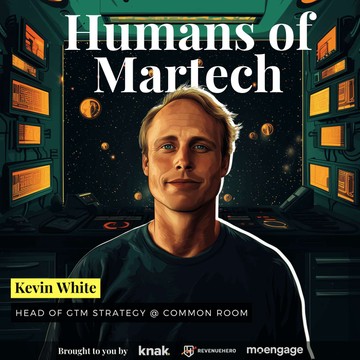
Aug 19, 2025 • 60min
183: Kevin White: Building a super IC role to escape management burnout and fixing the broken promise of AI SDRs
What’s up everyone, today we have the pleasure of sitting down with Kevin White, Head of GTM Strategy at Common Room. (00:00) - Intro
(01:00) - In This Episode
(02:59) - How to Design a Super IC Role for Senior Marketers
(09:11) - How to Get Comfortable With Public Visibility as an Introverted Leader
(10:39) - sing Empathy and Product Demos to Build Authentic GTM Strategies
(16:52) - How to Use Pain Points to Make Personalization Work
(19:21) - How to Use Buyer Behavior Signals to Improve Outreach Timing
(21:36) - Leveraging GitHub Signals to Drive High-Conversion Micro Campaigns
(24:57) - Smarter Account Prioritization With Buyer Signals
(29:02) - Why Messaging Drives GTM More Than Signals and Plays
(31:16) - Why Overengineered Tech Stacks Fail GTM Teams
(35:05) - Why AI SDR Agents Need Structured Coaching to Work
(41:43) - Why The Last Mile Of AI Marketing Still Belongs To Humans
(43:57) - AI Sharpens the Divide Between Experts and Amateurs
(45:46) - Why Declaring Human-Written Outreach Gets Better Responses
(48:00) - Futureproofing Operations Skills Through Challenge Driven Learning
(51:46) - Why Data Warehouses Are Taking Over Customer Data Platforms
(55:32) - Finding Career Balance Through Self Reflection
Summary: Kevin rebuilt his career around the work that fuels him. After years leading teams at Segment, Retool and Common Room, he walked away from politics and board decks to create a “super IC” role focused on experiments, product evangelism, and hands‑on growth. He applies that same mindset to go‑to‑market: strip out the bloat, ditch templated outreach, and use real buyer behavior to build small, personal campaigns. He treats AI as an amplifier for skilled marketers, using it to speed research and sharpen ideas, while relying on human judgment to make the output work. Even visibility, once draining for him, became a muscle he trained through repetition. Kevin’s story is a guide for marketers who want less political fluff, more impact, and roles built around the work they actually love to do.About KevinKevin White is a seasoned go-to-market leader with over 20 years of experience driving growth for high-growth SaaS companies. He’s held senior roles at Gigya, SingleStore, HackerOne, and Twilio Segment, where he built demand generation engines and scaled marketing operations during critical growth stages.Most recently, Kevin led marketing at Retool and advanced through multiple leadership roles at Common Room, from Head of Demand Generation to Head of Marketing, and now Head of GTM Strategy. He has also advised innovative startups like Ashby, Gretel.ai, and Deepnote, helping them refine their go-to-market strategies and accelerate adoption.How to Design a Super IC Role for Senior MarketersClimbing the marketing ladder feels like progress until you realize the work at the top is entirely different. Kevin spent years running teams at Retool and Common Room. He managed a dozen people, dealt with SDR team politics, prepared board updates, and handled internal marketing. Those tasks ate up his time and dulled his energy for the work that made him great in the first place. “My day-to-day was full of things I didn’t enjoy. One-on-ones, internal marketing, SDR team drama, board updates. None of it felt like what I wanted to be doing,” he said.Kevin thrived in the early-stage chaos. He loved being the first marketer, building programs from scratch, experimenting with growth channels, and connecting directly with customers. Those environments let him create instead of coordinate. He could see the direct impact of his work and feel close to the product. As companies grew, that hands-on work disappeared. He became a coach, a manager, and a political operator. For someone who values doing over directing, that was a poor fit.He worked with Common Room’s CEO to design a role that put him back in his zone. Now, as Head of GTM Strategy, Kevin functions as a “super IC.” He runs high-leverage growth experiments, drives product evangelism, and collaborates with a few freelancers instead of managing a team. That way he can focus on the work that delivers impact while avoiding the politics and administrative load that drained him. It is a custom role built around his strengths, and it brought back his enthusiasm for the job.Kevin’s thinking extends beyond his role. He shared how Common Room rethought sales development. They hired an excellent manager who knows how to attract and retain elite talent. Then they paid those top performers well above the market rate. “Harry is one of our SDRs,” Kevin explained. “We pay him a good amount because he produces outsized results. That playbook works.” In Kevin’s view, companies should build alternative tracks for individual contributors and reward them based on their production, not their willingness to manage people.Key takeaway: Create roles that match strengths instead of forcing people up a management ladder. Build paths for senior individual contributors who can deliver massive value without leading teams. Pay top performers according to their impact, not their title. If you manage teams, audit which roles could benefit from this model and where high-performers need more autonomy. If you are an individual contributor, consider what a custom role would look like that keeps you close to the work you do best.Building Confidence With Public Visibility as an Introverted LeaderPublic visibility exhausts many introverted leaders. Kevin describes finishing a full day at a conference feeling drained, running only on caffeine to get through the next one. Sharing his voice on LinkedIn or recording videos once felt unbearable. Even now, he admits to taking multiple tries before posting anything. Despite that discomfort, he continues to do it because the repetition has transformed the work from a chore into a habit.“I was mortified at myself when I first started recording things,” Kevin said. “But I kept hearing people say how helpful it was, and that positive reinforcement made it easier.”Kevin builds on small steps instead of waiting for confidence to appear. He creates a cycle where he pushes himself into uncomfortable situations, collects positive feedback, and uses that reinforcement to do it again. Over time, the acts that once caused him anxiety, like posting thought pieces or speaking publicly, have become regular parts of his work.He views visibility as a skill that can be practiced. Instead of thinking in terms of strengths or weaknesses, he treats every new action as training. This perspective removes the pressure to “perform” and reframes the process as building a muscle. That makes posting online, speaking at events, and showing up in public spaces a set of learnable behaviors rather than personal traits.You can use his approach:Start with small, low-stakes actions like sharing short ideas on LinkedIn.Progress to more challenging mediums such as podcasts or short recorded demos.Save positive responses to use as reminders when your motivation dips.Treat every effort as practice, which builds resilience and lowers fear over time.Key takeaway: Confidence grows through repetition. Build it by starting with small visibility actions, collecting reinforcement, and gradually increasing the difficulty of your public presence. That way you can turn something that drains you into a manageable, even natural, part of your role.Using Empathy and Demos to Build Authentic GTM StrategiesKevin remembers the grind of stitching together spreadsheets, Zaps, and Salesforce automat...
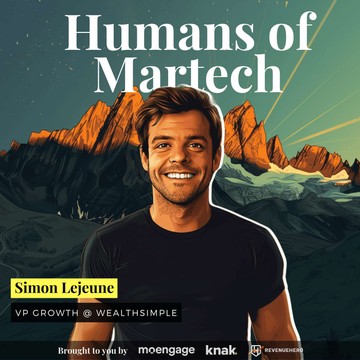
16 snips
Aug 12, 2025 • 1h 7min
182: Simon Lejeune: Wealthsimple’s VP of Growth on 2 keys to be a top 5% marketer
In this conversation with Simon Lejeune, the VP of Growth at Wealthsimple, he shares his expertise in scaling tech brands. He emphasizes the pitfalls of chasing local maxima in marketing and highlights the importance of bold strategies over trivial A/B testing. Lejeune advocates for measuring true incrementality by asking, 'What would have happened if we didn’t do this?' Additionally, he discusses the transformative role of AI in marketing, urging marketers to embrace creativity alongside analytical thinking for substantial growth.
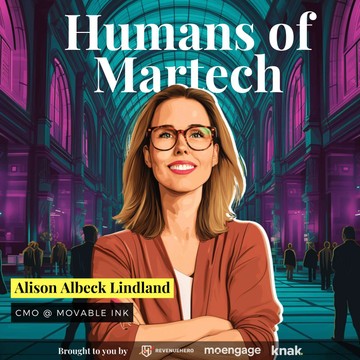
12 snips
Aug 5, 2025 • 59min
181: Alison Albeck Lindland: Climb the AI Literacy Pyramid and Stand Out as a Customer‑First Marketer
In this engaging conversation, Alison Albeck Lindland, the CMO at Movable Ink, shares her insights on elevating AI literacy within marketing teams. She emphasizes the power of customer relationships in future-proofing careers and discusses how to create a culture of experimentation. Alison also tackles the challenges of hiring AI-savvy talent and the balance between AI point solutions and platforms. Her approach to building personalized marketing strategies underscores the importance of adaptability and staying connected to customer needs.
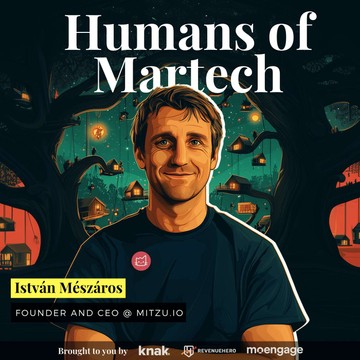
17 snips
Jul 29, 2025 • 59min
180: István Mészáros: Merging web and product analytics on top of the warehouse with a zero-copy architecture
István Mészáros, Founder and CEO of Mitzu.io, shares insights on merging web and product analytics using a zero-copy architecture. He explains how warehouse-native analytics can eliminate messy data syncs, allowing teams to collaborate on SQL efficiently. István highlights a striking cost reduction case, where a client's spend dropped from $500K to $1K post-switching to seat-based pricing. He also discusses the role of AI in analytics and the importance of understanding underlying data to maintain trust.
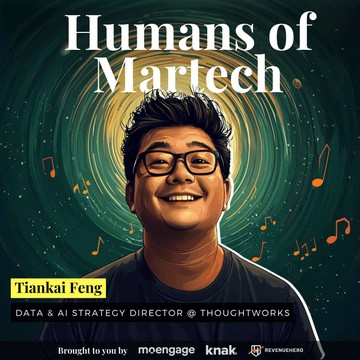
Jul 22, 2025 • 1h 5min
179: Tiankai Feng: The comeback of data quality and how NLP is changing the data analyst role
Tiankai Feng, Data & AI Strategy Director at Thoughtworks and author, explores the evolution of data roles in marketing. He discusses how data governance can feel like a Jedi Council, while marketing ops embodies the Rebel Alliance. Tiankai emphasizes the importance of blending creativity with data analysis and using practices like shadowing to enhance team collaboration. He highlights the comeback of data quality and how natural language processing is reshaping the data analyst's role, urging teams to cultivate relationships for better data-driven results.
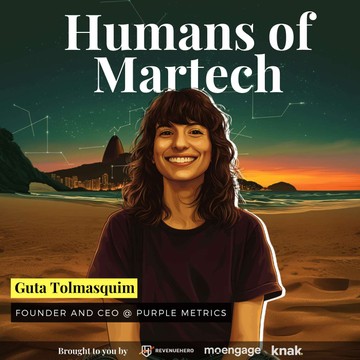
Jul 15, 2025 • 1h 7min
178: Guta Tolmasquim: Connecting brand to revenue with attribution algorithms that reflect brand complexity
What’s up everyone, today we have the pleasure of sitting down with Guta Tolmasquim, CEO at Purple Metrics. Summary: Brand measurement often feels like a polite performance nobody fully believes, and Guta learned this firsthand moving from performance marketing spreadsheets to startup rebrands that showed clear sales bumps everyone could feel. She kept seeing blind spots, like a bank’s soccer sponsorship that quietly cut churn or old LinkedIn pages driving conversions no one tracked. When she built Purple Metrics, she refused to pretend algorithms could explain everything, designing tools that encourage gradual shifts over sudden upheaval. She watched CMOs massage attribution settings to fit their instincts and knew real progress demanded something braver: smaller experiments, simpler language, and the courage to say, “We tried, we learned,” even when results stung. Her TikTok videos in Portuguese became proof that brand work can pay off fast if you track it honestly. If you’re tired of clean stories masking messy reality, her perspective feels like a breath of fresh air.How Brand Measurement Connects to RevenueBrand measurement drifted away from commercial reality when marketers decided to chase every click and impression. Guta traced this pattern back to the 1970s when companies decided to separate branding and sales into distinct functions. Before that split, teams treated branding as a sales lever that directly supported revenue. The division created two camps that rarely spoke the same language. One camp focused on lavish creative campaigns, and the other became fixated on dashboards filled with shallow metrics.Guta started her career in performance marketing because she valued seeing every dollar accounted for. She described those years as productive but ultimately unsatisfying. She moved to big enterprises and spent nearly a decade trying to make brand lift reports feel credible in boardrooms. She eventually turned her focus to startups and noticed a clearer path. Startups often have budgets that force prioritization. They pick one initiative, implement it, and measure its direct impact on revenue without dozens of overlapping campaigns.“When you only have money to do one thing, it becomes obvious what’s working,” Guta explained. “You almost get this A/B test without even planning for it.”That clarity shaped her view of brand measurement. She learned that disciplined isolation of variables makes results easier to trust. When a startup rebranded, sales moved in a way that confirmed the decision. The data was hard to ignore. Guta saw purchase volumes increase after brand updates, and she knew these signals were stronger than any generic awareness metric. The companies she worked with never relied on sentiment scores alone because they tracked actual transactions.Guta later built her own product to modernize brand research with a sharper focus on financial outcomes. She designed the system to map brand activities to revenue signals so marketing could prove its impact without resorting to vague reports. The product found traction because it respected the mindset of finance leaders and offered direct evidence that branding drives growth. Guta believed this connection was essential for any team that wants to secure resources and build trust across departments.Key takeaway: Brand measurement works best when you focus on one clear change at a time and track its impact on revenue without distractions. You can earn credibility with your finance partners by showing how brand decisions move purchase behavior in measurable ways. When you build discipline into measurement and align it with actual sales, you transform branding from a creative exercise into a proven growth lever.Examples Where Brand Investments Shifted Real Business OutcomesBrand investments often get treated as trophies that decorate a budget presentation. Guta shared a story that showed how sponsorships can drive specific business results when you track them properly. A Brazilian bank decided to sponsor a soccer championship. On the surface, the campaign looked like a glossy PR move. When Guta’s team measured what they called “mindset metrics,” they found that soccer fans reported higher loyalty toward the bank. The data set off a chain reaction that forced everyone involved to reconsider how they viewed sponsorships.The bank pulled internal reports and discovered a clear pattern. Fans who followed the soccer sponsorship churned at much lower rates than other customers. Guta said the marketing team realized they were sitting on a revenue engine they never fully understood. They began to see sponsorship as a serious retention tool rather than a vanity spend. That shift did not happen automatically. Someone had to ask whether the big brand push was connected to any measurable outcomes, and then look carefully for the link between sentiment and behavior.Guta described another client who rebranded their product suite under one name. They planned to delete the old LinkedIn pages that showed the previous brand identities. The team assumed nobody cared about those pages because LinkedIn conversions looked low in standard reports. Guta’s data proved otherwise. Those profiles accounted for more than 10% of conversions. Even though LinkedIn often buries links and limits reach, buyers visited those profiles before searching on Google and converting later.“Organic is a myth. It’s just conversions you forgot to measure.”Guta said this with the calm certainty of someone who has studied enough attribution to see where the gaps live. She explained that once you recognize how long it takes for a sponsorship impression to spark a branded search or a sale, you change how you plan. You stop guessing about campaign timing. You start working backward from the conversion window. If you expect a surge in July, you begin your campaigns in May so your budget has time to mature into real conversions instead of wasted impressions.Key takeaway: Map the path between your brand investments and your conversions with concrete data instead of assumptions. Use mindset metrics to identify early loyalty signals, then confirm whether those signals correlate with retention and branded search. When you see exactly how long each channel takes to drive revenue, you can plan campaigns months in advance and protect your budget with evidence that proves your strategy is working.The Tangible Outcomes of Brand: Purchase Intent and Memory StructuresBranding often carries a reputation as a soft layer of sentiment layered on top of performance campaigns, but Guta shares that it operates through a more rigorous mechanism than most teams realize. Branding creates memory structures that store signals in a person’s mind. When customers enter the market ready to buy, they retrieve those signals almost instantly. Their brains pull up familiar visuals, a sense of trust, or a specific promise that speeds up the choice. Guta has seen this happen repeatedly when people move straight from awareness to purchase without even visiting the company’s website again.Guta describes the reality that many marketing teams get stuck in a single-track mindset. They keep trying to hammer home immediate behaviors without any effort to create longer-term recall. She shares that brands can think about their work in two tracks running side by side:One track plants attributes in memory so customers can recall the brand later.The other track activates specific behaviors like trying, subscribing, or purchasing.When companies only focus on activation, they may end up with viral content that does not translate into any buying behavior. Guta has watched teams measure short-term engagement while ignoring whether the campaign ...
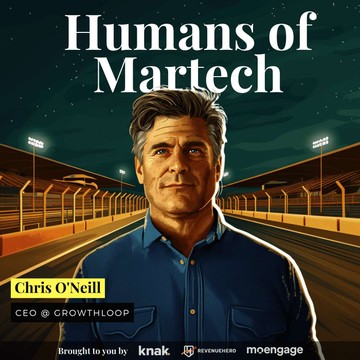
Jul 8, 2025 • 58min
177: Chris O’Neill: GrowthLoop CEO on how AI agent swarms and reinforcement learning boost velocity
What’s up everyone, today we have the pleasure of sitting down with Chris O'Neill, CEO at GrowthLoop. Summary: Chris explains how leading marketing teams are deploying swarms of AI agents to automate campaign workflows with speed and precision. By assigning agents to tasks like segmentation, testing, and feedback collection, marketers build fast-moving loops that adapt in real time. Chris also breaks down how reinforcement learning helps avoid a sea of sameness by letting campaigns evolve mid-flight based on live data. To support velocity without sacrificing control, top teams are running red team drills, assigning clear data ownership, and introducing internal AI regulation roles that manage risk while unlocking scale.The 2025 AI and Marketing Performance IndexThe 2025 AI and Marketing Performance Index that GrowthLoop put together is excellent, we’re honored to have gotten our hands on it before it went live and getting to unpack that with Chris in this episode. The report answers timely questions a lot of teams are are wrestling with:Are top performers ahead of the AI curve or just focused on solid foundations? Are top performers focused on speed and quantity or does quality still win in a sea of sameness?We’ve chatted with plenty of folks that are betting on patience and polish. But GrowthLoop’s data shows the opposite.🤖🏃 Top performerming marketing teams are already scaling with AI and their focus on speed is driving growth. For some, this might be a wake-up call. But for others, it’s confirmation and might seem obvious: Teams that are using AI and working fast are growing faster. We all get the why. But the big mystery is the how. So let’s dig into the how teams can implement AI to grow faster and how to prepare marketers and marketing ops folks for the next 5 years.Reframing AI in Marketing Around Outcomes and VelocityMarketing teams love speed. AI vendors promise it. Founders crave it. The problem is most people chasing speed have no idea where they’re going. Chris prefers velocity. Velocity means you are moving fast in a defined direction. That requires clarity. Not hype. Not generic goals. Clarity.AI belongs in your toolkit once you know exactly which metric needs to move. Chris puts it plainly: revenue, lifetime value, or cost. Pick one. Write it down. Then explain how AI helps you get there. Not in vague marketing terms. In business terms. If you cannot describe the outcome in a sentence your CFO would nod at, you are wasting everyone’s time.“Being able to articulate with precision how AI is going to drive and improve your profit and loss statement, that’s where it starts.”Too many teams start with tools. They get caught up in features and launch pilots with no destination. Chris sees this constantly. The projects that actually work begin with a clearly defined business problem. Only after that do they start choosing systems that will accelerate execution. AI helps when it fits into a system that already knows where it’s going.Velocity also forces prioritization. If your AI project can't show directional impact on a core business metric, it does not deserve resources. That way you can protect your time, your budget, and your credibility. Chris doesn’t get excited by experiments. He gets excited when someone shows him how AI will raise net revenue by half a percent this quarter. That’s the work.Key takeaway: Start with a business problem. Choose one outcome: revenue, lifetime value, or cost reduction. Define how AI contributes to that outcome in concrete terms. Use speed only when you know the direction. That way you can build systems that deliver velocity, not chaos.How to Use Agentic AI for Marketing Campaign ExecutionMany marketing teams still rely on AI to summarize campaign data, but stop there. They generate charts, read the output, and then return to the same manual workflows they have used for years. Chris sees this pattern everywhere. Teams label themselves as “data-driven,” while depending on outdated methods like list pulls, rigid segmentation, and one-off blasts that treat everyone in the same group the same way.Chris calls this “waterfall marketing.” A marketer decides on a goal like improving retention or increasing lifetime value. Then they wait in line for the data team to write SQL, generate lists, and pass it back. That process often takes days or weeks, and the result is usually too narrow or too broad. The entire workflow is slow, disconnected, and full of friction.Teams that are ahead have moved to agent-based execution. These systems no longer depend on one-off requests or isolated tools. AI agents access a shared semantic layer, interpret past outcomes, and suggest actions that align with business goals. These actions include:Identifying the best-fit audience based on past conversionsSuggesting campaign timing and sequencingLaunching experiments automaticallyFeeding all results back into a single data source“You don’t wait in line for a data pull anymore,” Chris said. “The agent already knows what audience will likely move the needle, based on what’s worked in the past.”Marketing teams using this model no longer debate which list to use or when to launch. They build continuous loops where agents suggest, execute, and learn at every stage. These agents now handle tasks better than most humans, especially when volume and speed matter. Marketers remain in the loop for creative decisions and audience understanding, but the manual overhead is no longer the cost of doing business.Key takeaway: AI agents become effective when they handle specific steps across your marketing workflow. By assigning agents to segmentation, timing, testing, and feedback collection, you can move faster and operate with more precision. That way you can replace the long list of disconnected tasks with a tight loop of execution that adapts in real time.How Reinforcement Learning Optimizes GenAI ContentReinforcement learning gives marketers a way to optimize AI-generated content without falling into repetition. Chris has seen firsthand how most outbound sequences feel eerily similar. Templates dominate, personalization tags glitch, and every message sounds like it was assembled by the same spreadsheet. The problem does not stem from the idea of automation but from its poor execution. Teams copy tactics without refining their inputs or measuring what actually works.Chris points to reinforcement learning as the fix for this stagnation. He contrasts it with more rigid machine learning models, which make predictions but often lack adaptability. Reinforcement learning works differently. It learns by doing. It tracks real-world feedback and updates decision-making logic in motion. That gives marketers an edge in adjusting timing, sequencing, and delivery based on signals from actual behavior.“It would be silly to ignore all the data from previous experiments,” Chris said. “Reinforcement learning gives us a way to build on it without starting over each time.”Chris believes this creates space for creative work rather than replacing it. Agents should own the tedious tasks. That includes segmenting lists, building reports, and managing repetitive logic. Human teams can then focus on storytelling, taste, and trend awareness. Chris referenced a conversation with a senior designer at Gap who shared a similar view. This designer believes AI lets him expand his creative range by clearing room for deep work. Chris sees the same opportunity in marketing. The system works best when agents handle the mechanical layers, and humans bring energy, weirdness, and originality.Many leaders are still caught in operational quicksand. Their teams wrestle with bl...
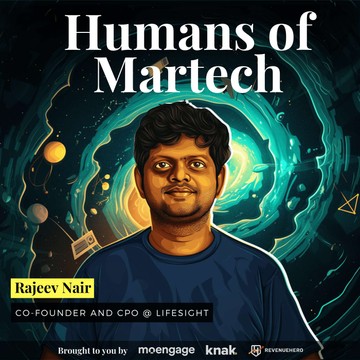
Jul 1, 2025 • 1h 9min
176: Rajeev Nair: Causal AI and a unified measurement framework
Rajeev Nair, Co-Founder and Chief Product Officer at Lifesight, shares insights on the future of marketing measurement. He advocates for a unified approach that combines multi-touch attribution, incrementality, and causal AI to uncover real driver insights. Rajeev dismantles traditional attribution myths, emphasizing that clarity beats correlation. By innovating a system beyond simple dashboards, he reveals the challenges marketers face with sparse data and tests. His work paves the way for improved decision-making and effective marketing strategies.


